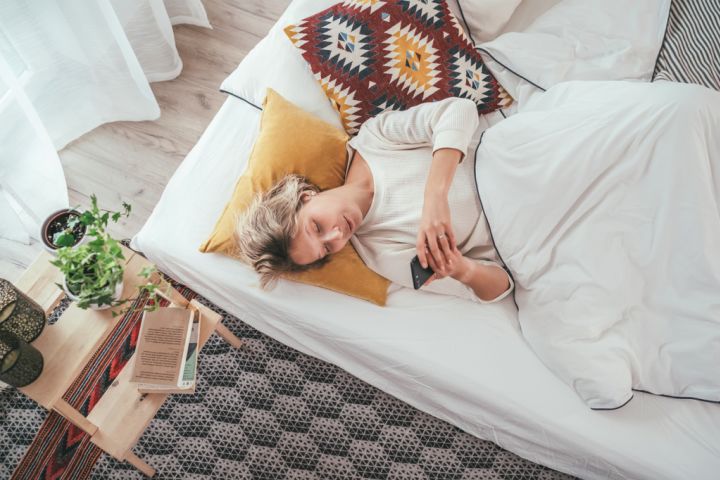The Importance of Sleep and Creating a Sanctuary
Sleep is essential. It’s the foundation of both physical and mental health. Yet, with the pace of daily life, many of us struggle to achieve the restorative rest our bodies need. A sleep sanctuary can be the answer. By intentionally designing your bedroom for comfort, relaxation, and peace, you create an environment that naturally promotes better sleep. Think of your sanctuary as a haven, a space that banishes stress and welcomes relaxation.
Decluttering and Optimizing Your Bedroom Space for Relaxation
Your bedroom is the heart of your sleep sanctuary. To create an environment that truly promotes rest, start by decluttering. Messy spaces can clutter the mind and lead to stress, which is the last thing you need before sleep. Keep the essentials close, like a calming book or a small plant, but store away items that don’t spark a sense of peace. Once decluttered, consider the layout. Optimize your space so it feels open and calming, with pathways clear of obstacles and a bed placed in a position of prominence and comfort.
Choosing the Right Bedding, Mattress, and Pillows
The physical comfort of your bed is one of the most important aspects of your sleep sanctuary. Invest in a mattress that supports your unique needs, whether it’s for back pain, pressure relief, or firmness preference. Bedding should be soft, breathable, and high-quality, ensuring comfort regardless of season. Pillows play a key role in neck and spine alignment, so select one that suits your sleeping position. Imagine wrapping yourself in cozy sheets and pillows tailored just for you—that’s what a true sanctuary feels like.
Incorporating Calming Colors, Lighting, and Sound
Colors affect our mood and mental state. For a restful environment, decorate your space with calming hues like soft blues, muted greens, or warm neutrals. Lighting also plays a critical role in your sanctuary’s atmosphere. Avoid harsh overhead lights in favor of dimmable lamps or warm-toned bulbs. When it comes to sound, create tranquility by blocking out disruptive noises with a white noise machine, calming nature sounds, or even soothing playlists.
Adding Natural Elements Plants and Aromatherapy
Nature has a unique way of grounding us, which makes incorporating natural elements into your bedroom essential for relaxation. Plants not only beautify your space but also improve air quality, which can enhance sleep. Popular choices include snake plants, lavender, and peace lilies. Pair your greenery with aromatherapy. Essential oils like lavender, eucalyptus, and chamomile can be diffused, added to a bath, or misted onto your bedding to create calming scents that invite sleep.
Establishing a Relaxing Bedtime Routine
A well-planned bedtime routine signals to your body that it’s time to wind down. This could include simple rituals like dimming the lights, reading a favorite book, or enjoying a cup of herbal tea. Some find mindfulness practices such as meditation or breathing exercises to be incredibly effective. Whatever you choose, make it consistent. This will help train your mind and body to relax as soon as you engage in these activities.
Minimizing Electronic Device Usage Before Bed
The glare of a screen is the enemy of melatonin, the hormone responsible for regulating sleep. Blue light emitted from phones, tablets, and computers tricks your brain into thinking it’s still daytime, making it harder to wind down. To minimize this, establish a no-device rule at least an hour before bed. If stepping away from your device isn’t an option, use blue light filters or glasses. Your sanctuary thrives with habits that put your rest first.
Managing Temperature and Air Quality
Comfortable sleep often depends on maintaining the right temperature and air quality in your bedroom. The optimal temperature for sleep is typically between 60–67°F. Invest in breathable bed linens to avoid overheating. Air quality is equally critical. Consider using an air purifier to remove allergens and pollutants, or crack a window for fresh air when weather permits. A clean, cozy environment supports your sanctuary’s success.
Herbal Remedies and Teas for Sleep
Herbal remedies can be the perfect addition to your sleep sanctuary. Chamomile tea, for example, is famous for its calming effects, while valerian root helps relax the nervous system. Lavender essential oil, when added to your diffuser or bath, creates an immediate sense of tranquility. Pair these remedies with practices like mindfulness or reading to gently ease your body and mind into slumber.
Creating a Personalized Sleep Sanctuary for Better Rest
Your sleep sanctuary is as unique as you are. Personalization is key to fostering a space that truly nurtures relaxation. Whether it’s the calming scent of lavender, the cozy feel of crisp cotton sheets, or the soft glow of a bedside lamp, every element should reflect your personal idea of comfort. Make your bedroom a sacred space that supports restful sleep, protects your peace, and recharges your mind and body for the day ahead.




